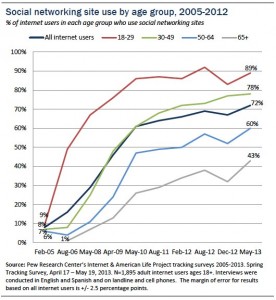One of the best parts about working in digital strategy is that you’re surrounded by compelling and unsolved problems.
[tl;dr for current Harvard students: we want to figure some out — sign up here.]The commercial web and email have been widely adopted for only about 20 years, so individuals and organizations are still figuring out ways to be and to interact online. In organizational settings from higher ed to corporate, digital natives are learning and working on teams with digital immigrants. We’re nearing an inflection point for a new organizational understanding of the role that digital, social, and mobile technologies play in community members’ lives.
The rise of social media, in particular, adds a new kind of complexity. Today, 72% of online adults use social networking sites. Facebook is only a decade old and has 1.15B users. Twitter is a significant enough news platform that it gets hacked right along with the New York Times. LinkedIn is a major content company, soon to admit teenagers to the professional fray. Music, travel, and fitness are just a few of previously private activities that now often reside in social shared spaces online. Given all these changes wrought by our new digital/social/mobile world, how do we think about new understandings of privacy on social networks and how expectations of privacy jibe with people’s organizational roles?
All these changes create new and interesting problems to be considered and solved about how organizations and their constituents interact. At Harvard we have myriad organizational social accounts, and of course students, faculty, and staff have their own. What are the new social norms for interaction?
Luckily Harvard’s Berkman Center has pulled together a pilot initiative around these digital problems and more. We are looking for current Harvard students to help define the questions we should be asking and develop some initial hypotheses. Please join me, along with faculty members including Misiek Piskorski and Joe Blitzstein and Harvard College senior and entrepreneur Zach Hamed. Read our guiding principles, and sign up here.
Source: Pew Internet
